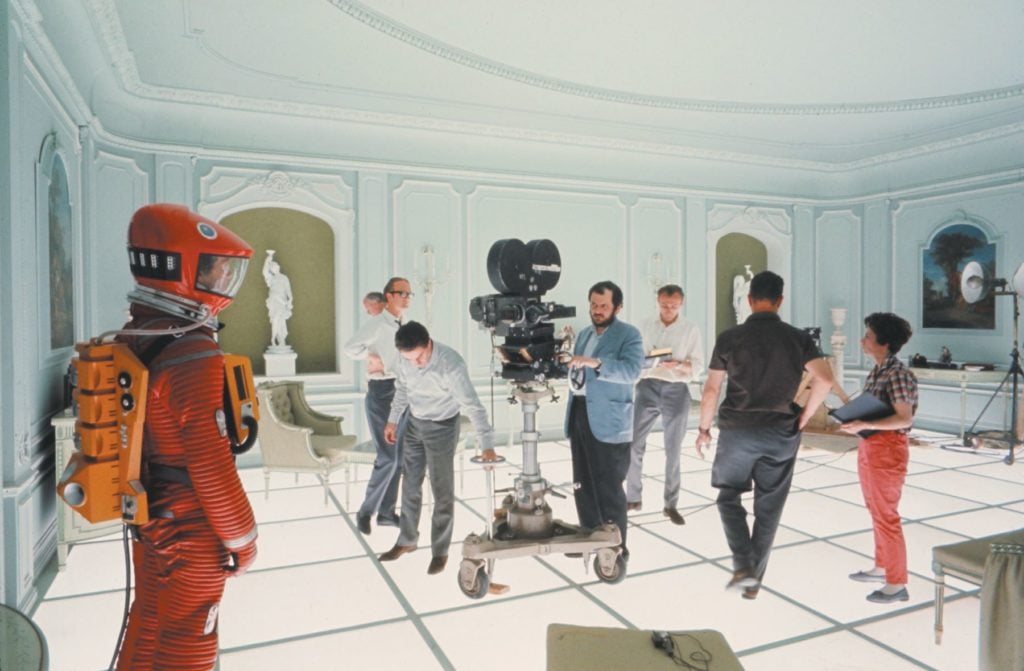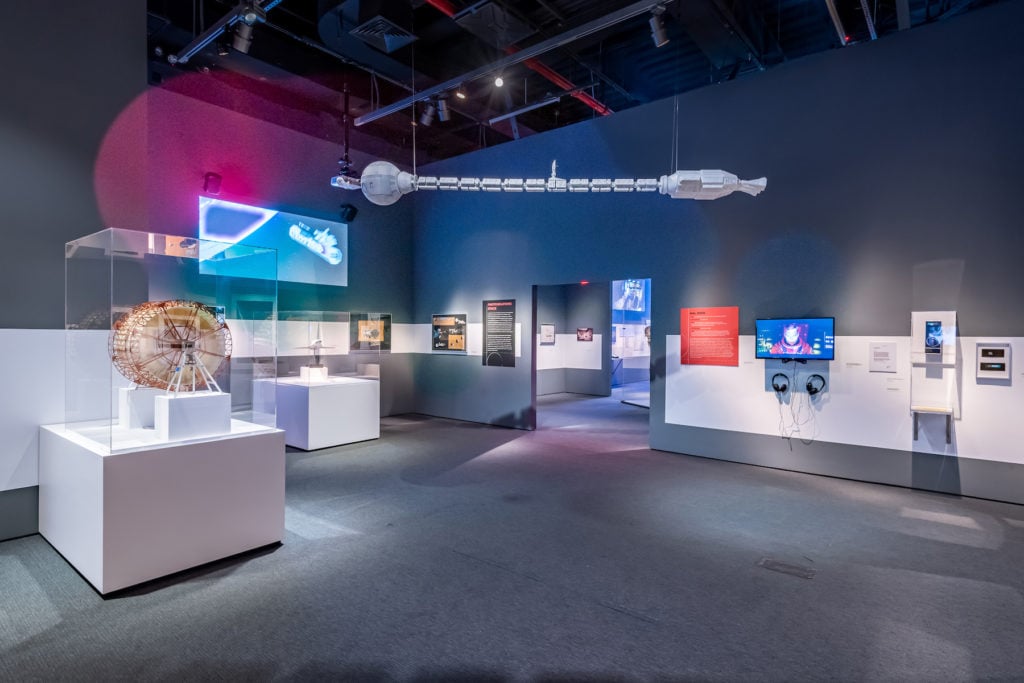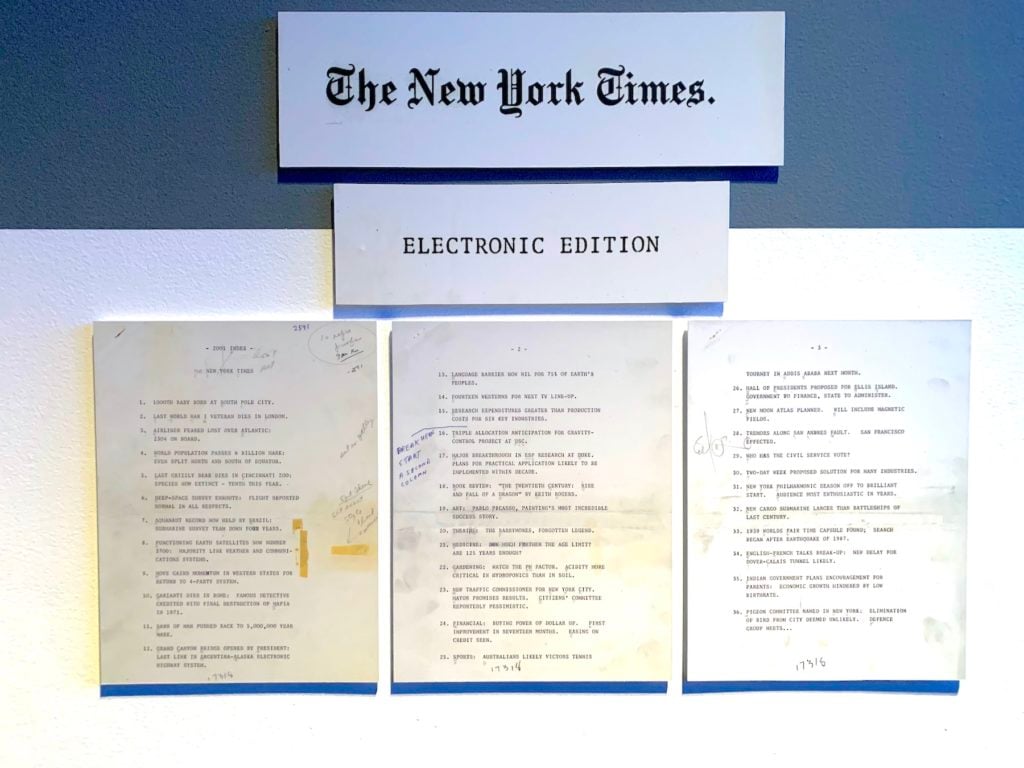On View
How Stanley Kubrick’s Vision of the Future in ‘2001: A Space Odyssey’ Predicted the Way We Consume News Today
The Museum of the Moving Image's show gives a glimpse of headlines from a hypothetical future digital New York Times.

The Museum of the Moving Image's show gives a glimpse of headlines from a hypothetical future digital New York Times.

Ben Davis

“Envisioning 2001” is the title of the Museum of the Moving Image’s new exhibition about Stanley Kubrick’s classic 1968 sci-fi opus. The name has a double meaning: The show is about how the director and his team envisioned the film 2001: A Space Odyssey; but it is also—and this may be an even more fun aspect of the exhibition—a show about how they envisioned the year 2001: what they got right, and what they got wrong.
Of the many, many wondrous enigmas of Kubrick’s 2001 narrative, the show does not actually reveal too much. And believe me, I could talk your ear off about 2001 and its strange three-act structure, which moves from consciousness discovering tools (the ape finding a bone club), to consciousness overcome by tools (the astronauts doing battle with AI), to some higher plane of consciousness beyond tools altogether (the “star child”)…
But that’s a digression. What “Envisioning 2001” does give you is all the props, the costumes, the set designs, and so on to confirm just how meticulously crafted and deeply imagined 2001: A Space Odyssey was. And that careful attention to detail included some earnest future-casting efforts to conjure up a credible near-future, giving viewers of this show a picture of the hopes and fears that the mid-1960s invested in the turn of the millennium. (There’s actually a cottage industry assessing the accuracy of 2001‘s projections, from the book 2001: Filming the Future to the short film Vision of a Future Passed.)

“Envisioning 2001: Stanley Kubrick’s Space Odyssey,” on view at Museum of the Moving Image. A model of the Discovery One space ship hangs above a gallery. To the left is a model of the Discovery centrifuge set, designed by Harry Lange. Credit: Photo: Thanassi Karageorgiou / Museum of the Moving Image.
Some of the movie’s futurology went well beyond the scope of what you ever see onscreen, amounting to 2001 deep lore: A document called “Makeup and Hair Fashions of 2001” prepared for the film by the makeup firm Coty, for instance, imagines “glowing ‘hair pins’ that, when inserted in the hair will color various areas” and a “spray applicator” that allows the user to “press a button and her full make-up will spray forth, each cosmetic adhering only to the proper portion of the face.” (Such high-tech accessories were more easily imaginable, from the film’s mid-’60s point of view, than female astronauts.)
Some of the production documents show Kubrick’s team having fun, even with such a serious film. Notes proposing magazines that could be mocked up to decorate the film’s future suggest Life, The New Yorker, Scientific American, and Vogue, but also invented turn-of-the-millennium titles such as Laser-Fun, E-T, Hydroponic News, and Cybernetics.
Some of the props were really prophetic, most notably the iPad-like “NewsPad” tablet computers that the astronauts read on in the film. These gadgets are amazingly prescient given that, famously, today’s average Apple device has thousands of times the processing power of all the computers aboard the Apollo 11 mission—and that didn’t even happen until 1969, the year after 2001 came out! In 2011, Samsung would even use clips of 2001 in court to prove that Apple couldn’t claim to have invented the tablet.
You could call the prediction of tablet computers uncanny, but the truth is that the film probably just inspired future designs. (Indeed, the “EVA Pod” spacecrafts shown in 2001 directly inspired the name for the “iPod”—so Kubrick’s influence is felt every time you listen to a podcast.)

Documents listing proposed headlines for the New York Times “Electronic Edition.” Image: Ben Davis.
My favorite detail in “Envisioning 2001,” though, is the list of 36 proposed headlines for the (then-theoretical) New York Times “Electronic Edition,” which would be read by the film’s astronauts on their NewsPads.
On the whole, these seem to picture a pretty placid future. While they hint at then-percolating environmental concerns (grizzly bears going extinct), they mainly suggest a vision of the world where government is robust (“Who Will Get the Civil Service Vote?”) and concerns itself mostly with pretty benign issues (traffic, pigeons, infrastructure).
Mainly you notice how ambitious the technological visions for the future are (ESP! Universal translation! Gravity control!) versus the very cautious cultural predictions (14 new Westerns on TV? A “most enthusiastic” symphony audience? Picasso as “painting’s most incredible success story”?) That’s an iron law of futurology: it’s much easier to extrapolate real sounding predictions about technology than about culture. That’s why the default fashion of the future is always minimal: the best bet is simply to remove anything that could look too specific.
In any case, if you’ve ever found yourself wondering what was going on in the 2001 universe back on earth while HAL and the gang were out hunting that monolith, read on for a list of headlines dreamed up by the filmmakers. (Oh, and—of course—the fake future New York Times has a reference to the 2001 plot itself—see headline number 6.)
1) 1000TH BABY BORN AT THE SOUTH POLE
2) LAST WORLD WAR I VETERAN DIES IN LONDON
3) AIRLINER FEARED LOST OVER ATLANTIC: 2304 ON BOARD
4) WORLD POPULATION PASSES 6 BILLION MARK: EVEN SPLIT NORTH AND SOUTH OF EQUATOR.
5) LAST GRIZZLY BEAR DIES IN CINCINNATI ZOO: SPECIES NOW EXTINCT—TENTH THIS YEAR
6) DEEP-SPACE SURVEY ENROUTE: FLIGHT REPORTED NORMAL IN ALL RESPECTS
7) AQUANAUT RECORD NOW HELD BY BRAZIL: SUBMARINE SURVEY TEAM DOWN FOUR YEARS
8) FUNCTIONING EARTH SATELLITES NOW NUMBER 3700: MAJORITY LINK WEATHER AND COMMUNICATIONS SYSTEMS.
10) GARZANTI DIES IN ROME: FAMOUS DETECTIVE CREDITED WITH FINAL DESTRUCTION OF MAFIA IN 1971
11) DAWN OF MAN PUSHED BACK TO 5,000,000 YEAR MARK
12) GRAND CANYON BRIDGE OPENED BY PRESIDENT: LAST LINK IN ARGENTINA-ALASKA ELECTRONIC HIGHWAY SYSTEM
13) LANGUAGE BARRIER NOW NIL FOR 75% OF EARTH’S PEOPLES
14) FOURTEEN WESTERNS FOR NEXT TV LINE-UP
15) RESEARCH EXPENDITURES GREATER THAN PRODUCTION COSTS FOR SIX KEY INDUSTRIES
16) TRIPLE ALLOCATION ANTICIPATION FOR GRAVITY-CONTROL PROJECT AT USC
17) MAJOR BREAKTHROUGH IN ESP RESEARCH AT DUKE. PLANS FOR PRACTICAL APPLICATIONS LIKELY TO BE IMPLEMENTED WITHIN DECADE
18) BOOK REVIEW: “THE TWENTIETH CENTURY: RISE AND FALL OF A DRAGON” BY KEITH ROGERS
19) ART: PABLO PICASSO, PAINTING’S MOST INCREDIBLE SUCCESS STORY
20) THEATRE: THE BARRYMORES, FORGOTTEN LEGEND
21) MEDICINE: HOW MUCH FURTHER THE AGE LIMIT? ARE 125 YEARS ENOUGH?
22) GARDENING: WATCH THE PH FACTOR. ACIDITY MORE CRITICAL IN HYDROPONICS THAN IN SOIL
23) NEW TRAFFIC COMMISSIONER FOR NEW YORK CITY. MAYOR PROMISES RESULTS. CITIZENS’ COMMITTEE REPORTEDLY PESSIMISTIC
24) FINANCIAL: BUYING POWER OF DOLLAR UP. FIRST IMPROVEMENT IN SEVENTEEN MONTHS. EASING ON CREDIT SEEN
25) SPORTS: AUSTRALIANS LIKELY VICTORS TENNIS TOURNEY IN ADDIS ABABA NEXT MONTH
26) HALL OF PRESIDENTS PROPOSED FOR ELLIS ISLAND. GOVERNMENT TO FINANCE, STATE TO ADMINISTER
27) NEW MOON ATLAS PLANNED. WILL INCLUDE MAGNETIC FIELDS
28) TREMORS ALONG SAN ANDRES FAULT. SAN FRANCISCO EFFECTED
29) WHO HAS THE CIVIL SERVICE VOTE?
30) TWO-DAY WEEK PROPOSED SOLUTION FOR MANY INDUSTRIES
31) NEW YORK PHILHARMONIC SEASON OFF TO BRILLIANT START. AUDIENCE MOST ENTHUSIASTIC IN YEARS
32) NEW CARGO SUBMARINE LARGER THAN BATTLESHIPS OF LAST CENTURY
33) 1939 WORLDS FAIR TIME CAPSULE FOUND; SEARCH BEGAN AFTER EARTHQUAKE OF 1987
34) ENGLISH-FRENCH TALKS BREAK-UP; NEW DELAY FOR DOVER-CALAIS TUNNEL LIKELY
35) INDIAN GOVERNMENT PLANS ENCOURAGEMENT FOR PARENTS: ECONOMICS GROWTH HINDERED BY LOW BIRTHRATE
36) PIGEON COMMITTEE NAMED IN NEW YORK: ELIMINATION OF BIRD FROM CITY DEEMED UNLIKELY. DEFENSE GROUP MEETS…
“Envisioning 2001: Stanley Kubrick’s Space Odyssey” is on view at the Museum of the Moving Image, Queens, through July 19, 2020.